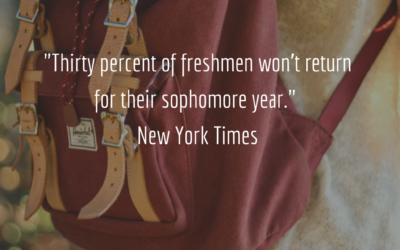
The headline may sound provocative, but it is necessary to help college parents focus on reality. Many of our students are not ready for college life.
According to an article in the New York Times by authors, William Stixrud and Ned Johnson, experts on the topic and the authors of “The Self-Driven Child: The Science and Sense of Giving Your Kids More Control Over Their Lives. “thirty percent of freshmen won’t return for their sophomore year, and the wheels can start to fall off as early as Thanksgiving.
We don’t talk about it much, but many teenagers go away to college only to recognize — either because of their grades, their habits, their mental health or all of the above — that they’re not ready for college life. Parents tend to think of getting into college as the finish line of a race. They may worry about their high schooler’s grades, or tech usage, or friend group, but tell themselves, “As long as my kid gets off to college, it will be fine.”
College Parents of America was mission is to help families achieve the goal of a college education. We know and have long been advocates that college readiness is essential to increasing college completion. The reality is given the cost of a higher education it is important to stay focused on the goal. Data from the nonprofit Complete College America, demonstrate that only 20 percent of students complete a bachelor’s degree in four years. And only 57 percent of students who enroll in college will graduate in six years.
Set Backs Are Real & Common:
- “First, college life is a highly dysregulated environment with inconsistent sleep patterns and diets, little structure, and an abundance of binge-drinking, pot-smoking, and abuse of stimulants like Adderall.
- Second, students haven’t been given control of their own lives until way too late. You wouldn’t tell a kid to merge onto the freeway the first time he gets behind the wheel of a car, and yet that’s essentially what we do in expecting students to go from parental control to near-total freedom.”
College Parents of America has long reported on these factors and the recent growth in student health issues that impact college completion. In fact, “one out of every three freshmen reports symptoms of a psychological disorder, and the number of students seeking mental health care on campus is increasing rapidly. According to the American College Health Association, 62 percent of undergrads reported feeling “overwhelming anxiety.” According to the authors, college students are also vulnerable to other factors such as alcohol, substance abuse and lack of reliable sleep.
 Recommendations for Parents: The article concludes with these useful tips for parents, but most of all we suggest purchasing the book – The Self-Driven Child.
Recommendations for Parents: The article concludes with these useful tips for parents, but most of all we suggest purchasing the book – The Self-Driven Child.
- “If you question your teenager’s readiness for college at the end of high school, you cannot expect that he or she will be ready by fall. It takes time, practice and some failure to learn how to run a life. And you don’t want your child to learn these lessons in an environment that is as toxic as it is expensive.
- If you have a student who has started college, the struggle may be evident in midterm grades. Many parents, however, don’t see those grades. We often recommend that parents — particularly those of vulnerable students — make signing the grade release a prerequisite of funding college. After all, you wouldn’t invest in a company without being able to see its quarterly earnings.”
- Remember that what your child needs most is practice running his or her own life — and college is a risky place to do that for the first time.”
Most of all, we agree with the statement of the authors that “the parents’ role is to avoid disaster, not micromanage short-term performance.”
Lastly – as the holidays approach it is important for families to discuss how the transition to college life is going. It is important for college families to be aware that their college and university likely have many support services on campus. Encourage your student to take action and learn how to seek help and assistance, be it in the form of tutoring or mental health counseling. Resist the urge to do this for your student and recall that self-driven fundamentally means letting your student take action themselves.



